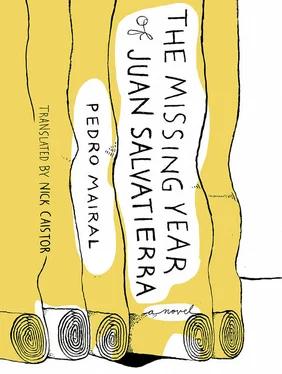“Luis,” I called out to him. “Luis!”
I didn’t see him turn round, and only realized he had when he was right on top of me, grabbing my shirt.
“How could you ask him that? How could you?”
I tried to free myself. I was as shocked as he was. Shouting to him to let go of me, I grasped his hands and tried to push him off. We struggled.
“Let go of me,” I was shouting, but he wouldn’t stop shaking me.
“How could you ask him that?”
Nothing made sense. I pushed him hard and we both fell to the ground. It was as if in the darkness we had no age. We fought like adolescents.
Luis wouldn’t let me go. The neighborhood dogs started barking. It was like a drunken brawl. Time and again I told him it wasn’t my fault. Eventually I managed to stand up and loosen his grip. He sat in the middle of the dirt road.
I waited, but when he didn’t get up I walked off. I heard him coming behind me. Did we have a half-brother? Perhaps Salvatierra had had a son with that black woman who appeared in the canvas? The fisherman Ibáñez had gone crazy that drunken night in the shed when he recognized his sister in the painting. Possibly he even knew Salvatierra had got his sister pregnant. That was why Ibáñez had slashed the canvas then later on stolen it, or collaborated with Jordán to steal it. Is that how it had been? As well as his affair with Eugenia Rocamora, the woman in the Post Office? Could there have been more women we would never find out about? And more children?
I felt crushed by all this, on top of my tiredness. I was exhausted, numb. Who had my father been? It seemed to me I didn’t know him. It seemed to me I had just seen him rowing our boat, his silhouette etched against the orange sky. Salvatierra had been like the two banks of the river. My mother and that black Uruguayan woman. Which of the two banks was he on? Perhaps he would always remain hidden, down where the two shores touch beneath the water.
We drew closer to the commotion we heard up in front of us. We saw people running towards the glow in the sky a few blocks further on. I thought perhaps there was some kind of performance outside the supermarket. A boy came running past, so I asked him:
“What’s going on?”
“A fire,” he said.
I hurried on, but something within me seemed to be running backwards, fleeing. With each step it became more and more obvious that what I feared was happening.
The shed was in flames.
I know I ran and had to be restrained by several of the neighbors. But my images of that moment are confused. The shed was burning down: the roof seemed to have collapsed, and tongues of fire leapt into the air. I shouted for someone to call the firemen, but was told they were already on their way. I was so distraught, they thought there must be people inside. I can remember the heat on my body, and the sensation of not being able to accept what was happening. It wasn’t right. A whole life’s work was being lost in the fire. I was desperate, shouting for buckets and water, but they grabbed me by my clothes and tried to persuade me it was no use. I struggled with them. I couldn’t accept it. It was as though my entire life and that of my family were going up in flames. My memory, my childhood. Salvatierra’s years, the time we had together, his colors and all his effort, his talent, his days, his enormous, silent affection for the world. All going up in flames. Everything that gave his life meaning, as well as the efforts I, Luis and mom had made. The images of Estela vividly alive in the painting, her eyes as if they were about to look at you. The endless river going up in flames forever. It wasn’t right.
Luis put his arm round my shoulder, and I saw him weep. We stood there staring, breathing in the hot air of our impotence at being unable to put out this inferno. The oil of the paint and the canvas set the rolls blazing like huge torches. Aldo, Boris and Hanna came up to us: they’d been waiting for us outside our house. They couldn’t believe what they were seeing. They asked us what had happened, and we asked them the same. They said they had finished work at seven. They had padlocked the door shut. They hadn’t left anything lit. Fortunately, as it was their last day, they had taken out the scanner and their equipment. Boris stood blinking at the blaze, still holding the bottle of wine he’d brought for the barbecue. Then he began to walk around and around in circles, cursing in Dutch, before coming to a halt again. Each of us was grieving in our own way. The locals who gathered to look thought it was entertaining, because they had no idea of the dimension of our loss.
Later, the firemen arrived, but there was nothing they could do. They asked us what was inside, and when we explained, they said it was highly flammable material, and the best they could do was to prevent the fire spreading to the neighboring plots of land.
There’s no point in dwelling on our sadness at having to watch the shed burn all night, or of how at first light we were finally able to enter, with the smell of burning everywhere, ashes in pools of water, twisted metal rafters, the round iron stove that was the only thing left intact. We were unable to rescue a single meter of the rolls of Salvatierra’s painting that had been stored there.
Now there’s a parking lot where the shed once stood. Just as Baldoni wanted. I saw this in a French documentary on Salvatierra’s life and work. There was no way we could prove that the fire was deliberate, or that Baldoni was to blame. There’s no doubt though that his people did it. The door had been forced. He claimed it had been his political enemies, who broke in thinking the shed was his. Supposedly they imagined this was where he hid donated goods like mattresses and boxes of food. When they found nothing, they took revenge by setting fire to it.
In order not to sell the land to Baldoni, we sold it to someone else; but he resold it to the supermarket owner not long afterwards.
We recovered the roll we had left in Ibáñez’s place over in Uruguay. I crossed the border with the Dutch couple by the international bridge. Luis didn’t want to come. Aldo couldn’t because he had no documents. So I went with Hanna and Boris. Between us we scanned the only roll that had survived the fire.
I managed to take Ibáñez to one side and tell him what I believed. I told him that perhaps Salvatierra had been his father, and that possibly we were half-brothers. I didn’t sense much of a reaction in him, as though either he was not interested or because the news had come too late to make any difference. I felt I had to tell him though, however awkward it might make us both feel. I told him that, partly thanks to him, the one existing fragment of Salvatierra’s painting had been rescued. When I told him about the fire, he was only sad that we wouldn’t be transferring the rolls, because he said he had already struck a deal with the owner of quite a big boat.
Boris and Hanna took the one surviving roll and the entire digitalized version of the work with them. At Customs they simply said they had painted it themselves, and they had no problems at all. That was how the canvas got to the Röell Museum in Amsterdam.
Some time ago I read this phrase: “The page is the only place in the universe God left blank for me.” I can’t remember where I read that. It caught my attention because that’s what I felt about my dad. I was never much of a believer, because the idea of adding a spiritual father to the gigantic biological one I already had seemed to me overwhelming. I understood the phrase to mean: “The page is the only place in the universe my father left blank for me.” We occupy the places our parents leave blank. Salvatierra occupied a marginal space as far away as possible from my grandfather’s hopes of his becoming a cattle rancher. I inhabit the words that Salvatierra’s muteness left untouched. I began to write a couple of years ago. I feel that this place, the space of the blank page, is mine, independently of what the results may be. The whole world fits into this rectangle.
Читать дальше












